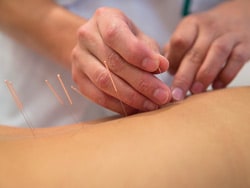Medscape readers responded to a controversial discussion on alternative treatments.
Physicians are increasingly dealing with patients who want treatments that are considered alternative. These treatments are often untested or unapproved, but patients say that they may work better for them than traditional medicines.

Whereas many clinicians are fans of complementary or alternative medicine, other physicians find it distressing, particularly when a patient is using alternative treatments for a serious disease, such as cancer. Complementary medicine is used together with conventional medicine and includes acupuncture, biofeedback, and chelation therapy (which claims to remove toxic substances and heavy metals from an individual's bloodstream), among others.
In a recent Medscape.com Both Sides Now discussion, Arthur Caplan, director of the Division of Medical Ethics at NYU School of Medicine asked: Should doctors embrace or reject alternative treatments?
The discussion featured Dr Steven Novella, assistant professor of neurology at Yale School of Medicine, who expressed the view that complementary and alternative medicine is mostly a scam and should not be pursued. Also on hand was Dr Ronald Hoffman, medical director of the Hoffman Center in New York and a complementary medical practitioner, who holds that a natural medical approach can be the key to wellness. The discussion sparked many comments from physicians.
A rheumatologist said:
I would keep an open mind. This makes the patient feel more comfortable, and more likely to share what he/she is doing at home with supplements, herbs, etc. Having said that, we are inundated with charlatans emailing everybody around with how great this and that approach would be to heal and cure just about everything under the sun, promoting books, subscriptions, etc.; these are more likely to inflict harm on unsuspecting readers than really help anybody.
An expert in health business administration said:
Interesting discussion. Much of what is treated by standard medical treatments and by alternative practitioners tends to resolve on its own. This is confusing for individual patients who experience disease and treatment individually. A patient had X disease, and it was treated with Y treatment; ergo, it is assumed that X resolved Y for that individual patient. So, individual patients can be forgiven for a lack of scientific perspective of the validity and reliability of their "cure." Professional practitioners cannot, in good conscience. "Alternative" and "complementary" medicine is a mix of a lot of charlatanism and a bit of pre-mainstream medicine (which will ultimately be proved out). Legitimate practitioners have to be skeptical if they want to maintain legitimacy, but should be open to evidence.
Alternative medicine does have its adherents among doctors. One physician described her personal experience using alternative medicine:
I believe I am alive today because I sought out alternative practitioners when, after consultations and a myriad of tests by seven different specialists, none found or diagnosed the 14-cm ovarian cancer tumor that had me at death's door. I had surgery to remove the tumor, then declined the highly recommended chemotherapy regimen. I followed instead a detoxification regimen, pH balancing, strict organic diet, and supplements that have cost approximately $5000-$10,000 per year. I'm cancer-free, and it's been almost 4 years since my diagnosis and surgery.
Several clinicians believe that there is evidence that complementary medicine is effective. One clinician noted:
It is very sad that the mantra of "there is no evidence for complementary medicine" is being repeated by so many doctors who never bother to look for the evidence. About 6000 papers are published every year in relation to plant medicine (herbal medicine, botanical medicine)—there have been numerous RCTs that show the benefits of medicinal plants. Just type "Curcuma longa" or "Hypericum perforatum" in PubMed.
However, this physician warned:
Doctors should first learn the fundamentals of analyzing published data of any nature or treatment. The number of flawed publications with regard to allopathic treatments that have subsequently been shown to be wishful thinking is not insignificant. As is true with some or many papers regarding alternative therapies, the old saying, 'If you can't square a truth, at least don't spread lies' seems to fit all interventions we suggest.
Several physicians and alternative care practitioners noted that an integrative approach can be beneficial to patients. A physician said:
The patient has the right to choose the type and modality of health and medical care, and please remember that alternative and complementary medicine is not for everyone. People need to take charge and responsibility for their health and well-being. An integrative approach is needed in this regard. I make a point of encouraging people that I come in contact with to make use of the appropriate medical professionals.
Benefits and Drawbacks
An internist explained that alternative treatments have drawbacks and benefits:
Most times, alternative treatment is level E—expert opinion. Double-blind trials are lacking, usually. Definitely placebo effects can be wonderful, at times. The atmosphere in alternative treatment centers is great and instills positivity at times, so much so that spontaneous remissions are seen and are given credit. When allopathy tells no cure, these therapies are used with hope. The hope itself improves outcomes. Lifestyle modification occurs through some of these treatments, and thus would be useful to a particular patient.
Good nutrition was mentioned by several respondents. An internist noted, "Interestingly, when advising our patients, I tend toward natural, unprocessed foods, moderation and balance in diet and exercise, and the maintenance of a normal weight. [This] is the only guidance that stands up as the scientific particulars change from year to year."
Finally, an oncologist emphasized, "In our hospital, we regularly bring the patients with nutrition specialists in contact, and it is not considered as 'alternative.' This is part of our evidence-based practice. There are results of well-conducted randomized trials about nutritional support during and after treatment."
Medscape Family Medicine © 2018 WebMD, LLC
Any views expressed above are the author's own and do not necessarily reflect the views of WebMD or Medscape.
Cite this: Sandra Levy. Should Doctors Embrace or Reject Alternative Treatments? - Medscape - Jan 09, 2018.










Comments